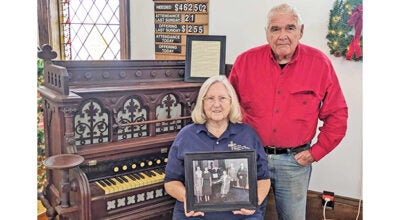Ask Trooper Rob: Set off fireworks safely
Published 7:05 pm Thursday, July 5, 2012
While the Fourth of July has passed, fireworks remain a staple for evening and weekend enjoyment. Due to change in Michigan’s law, consumers may now legally purchase and use more powerful fireworks, including firecrackers, bottle rockets, sky lanterns and Roman candles. The sale and use of consumer fireworks became legal Jan. 1. Remember to be safe and responsible with these fireworks. Listed are a few safety tips.
• Read and follow all safety instructions.
• Never allow children to play with fireworks.
• Only use fireworks outside.
• Only light devices on smooth, flat surfaces away from residential areas, dry leaves and flammable material.
• Always keep a hose or bucket of water nearby in case of malfunction.
• Never try to relight fireworks that have not fully functioned.
Make this an enjoyable and safe holiday for all.
On Oct. 12, 1972, Trooper Steven DeVries, 32, was on his first day back on duty after a vacation. About 8:40 that morning, DeVries, who had enlisted in the Michigan State Police on Feb. 21, 1965, was patrolling in a semi-marked patrol vehicle on U.S. 12 near Niles, when radio traffic told of a bank robbery that had occurred at the First National Bank of Southwestern Michigan in Niles.
A few minutes later, DeVries stopped a vehicle for speeding between Portage and Weaver roads.
The driver of the speeding vehicle was Kenneth Oliver, who was free on bond on federal bank robbery charges in New York and was being sought in connection with a bank robbery in Grand Rapids. Earlier that morning, Oliver kidnapped a former bank employee outside his home and locked him in the trunk of his own car before driving the stolen car to the bank.
Armed robber
Armed with a .38 caliber revolver and disguised with gauze face wrapping and a football helmet, he seized a teller who had just opened the bank, forced her inside and stole $40,000 from the vault. He then kidnapped her and, with the first hostage still in the trunk, drove from the scene. A few miles later, he abandoned that car and the hostages and left in a getaway car he had waiting. This is when he was stopped for speeding.
After contacting Oliver, DeVries went back to his patrol car and wrote down Oliver’s name and description. He contacted the Post, but there was no new information on the bank robbery at that time. He went back and confronted Oliver, who was now standing between the two vehicles.
Oliver suddenly pulled out the revolver and shot DeVries in the chest, then fired two more shots in the trooper’s back and thigh as he lay on the ground clutching his unfired revolver. Oliver fled the scene, abandoning his car in Bertrand Township and took off on foot into South Bend, hiding the gun and money along the way.
In the meantime, a passing motorist who witnessed the shooting stopped and attended to the fallen trooper and alerted police.
Within minutes, DeVries was transported to Pawating Hospital, where he was pronounced dead only a half hour after the robbery.
Manhunt launched
Armed with the witness’s information and DeVries notes, the state police and FBI launched a massive manhunt using helicopters, tracking dogs and nearly 200 officers from 13 police agencies in Michigan and Indiana. With the tips received,
Oliver was arrested the next day in South Bend.
He waived extradition and was taken to the Berrien County jail for prosecution on state and federal charges.
The prosecutor had difficulty with the case as the weapon and money had not been found. However, Oliver helped convict himself when deputies intercepted an incriminating letter to his father that he tried to smuggle out of the jail along with a map showing the location of the gun and money.
Convict escapes
Oliver was sentenced to several concurrent life terms in the Southern Michigan Prison in Jackson. In 1975, he escaped by hiding with other bags of garbage but was later recaptured in California and returned to Jackson.
He escaped again July 4, 1987, but was later killed in December 1987 during a gun battle with sheriff’s deputies in Mississippi after fleeing from another bank robbery.
DeVries was a Navy veteran and also had a brother, David, who retired from the MSP as a lieutenant. Steve’s wife, Ardena, was also the sister-in-law of Trooper Gary Rampy, who had been killed a year earlier. Steve DeVries, the only trooper killed from the Niles Post, is buried in Grand Rapids and was the 28th trooper to die in the line of duty.





